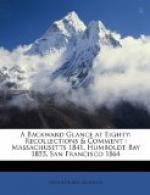They continued down the beach, camping when night overtook them. Wood, the chronicler of the expedition, [Footnote: “The Narrative of L.K. Wood,” published many years after, and largely incorporated in Bledsoe’s “History of the Indian Wars of Northern California,” is the source of most of the incidents relating to Gregg’s party embraced in this chapter.] and Buck went in different directions to find water. Wood returned first with a bucketful, brackish and poor. Buck soon after arrived with a supply that looked much better, but when Gregg sampled it he made a wry face and asked Buck where he found it. He replied that he dipped it out of a smooth lake about a half mile distant. It was good plain salt water; they had discovered the mythical bay—or supposed they had. They credulously named it Trinity, expecting to come to the river later. The next day they proceeded down the narrow sand strip that now bounds the west side of Humboldt Bay, but when they reached the harbor entrance from the ocean they were compelled to retrace their steps and try the east shore. The following day they headed the bay, camping at a beautiful plateau on the edge of the redwood belt, giving a fine view of a noble landlocked harbor and a rich stretch of bottom land reaching to Mad River. Here they found an abundant spring, and narrowly missed a good supper; for they shot a large elk, which, to their great disappointment, took to the brush. It was found dead the next morning, and its head, roasted in ashes, constituted a happy Christmas dinner—for December 25th had arrived, completing an even fifty days since the start from Rich Bar.
They proceeded leisurely down the east side of the bay, stopping the second day nearly opposite the entrance. It seemed a likely place for a townsite, and they honored the water-dipping discoverer by calling it Bucksport. Then they went on, crossing the little stream now named Elk River, and camping near what was subsequently called Humboldt Point. They were disappointed that no river of importance emptied into so fine a bay, but they realized the importance of such a harbor and the value of the soil and timber. They were, however, in no condition to settle, or even to tarry. Their health and strength were impaired, ammunition was practically exhausted, and there were no supplies. They would come back, but now they must reach civilization. It was midwinter and raining almost constantly. They had little idea of distance, but knew there were settlers to the south, and that they must reach them or starve. So they turned from the bay they had found to save their lives.
The third day they reached a large river flowing from the south, entering the ocean a few miles south of the bay. As they reached it they met two very old Indians loaded down with eels just taken from the river, which the Indians freely shared with the travelers. They were so impressed with them and more that followed that they bestowed on the magnificent river which with many branches drains one of the most majestic domains on earth the insignificant, almost sacrilegious name of Eel!




